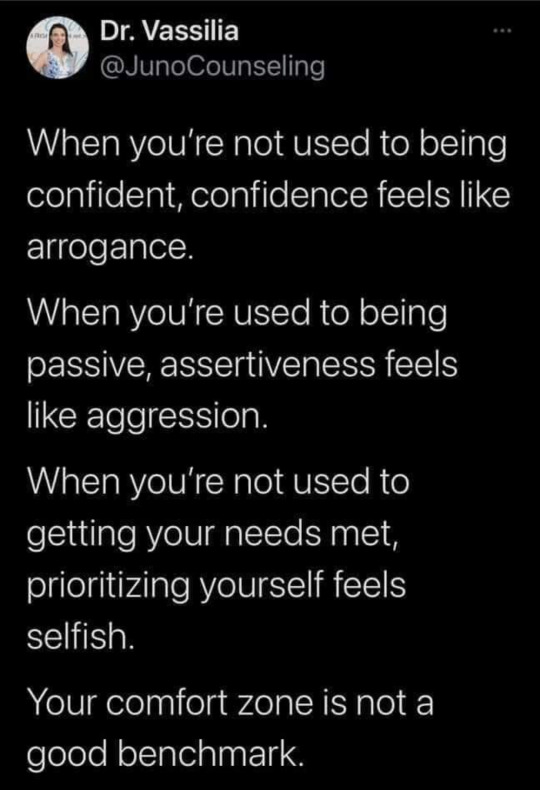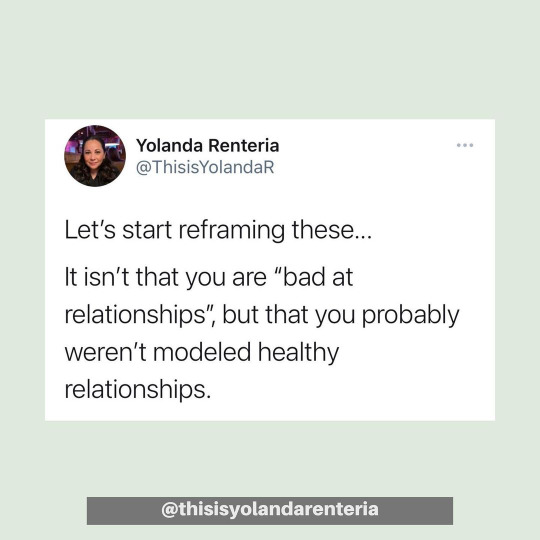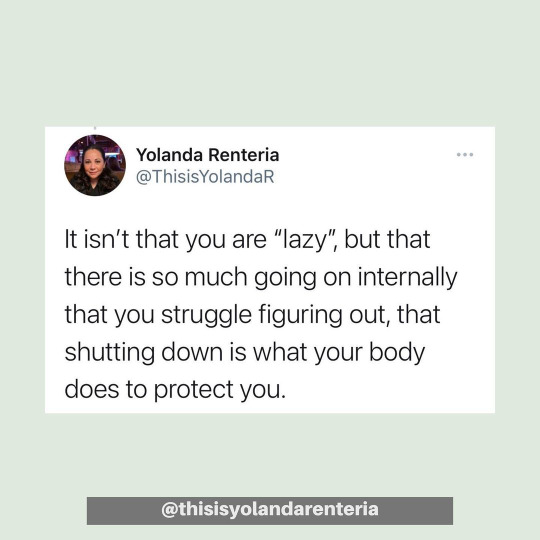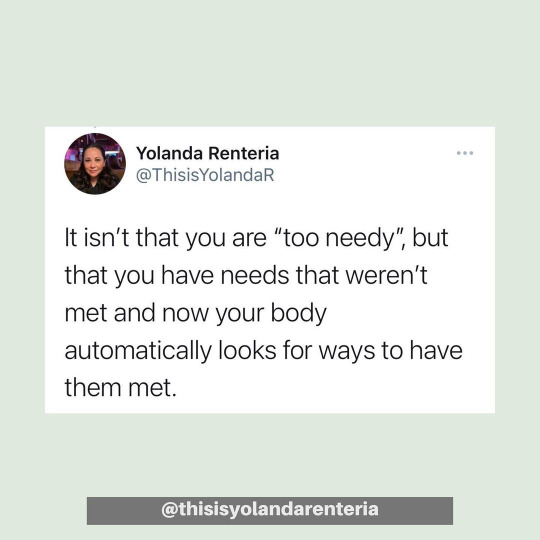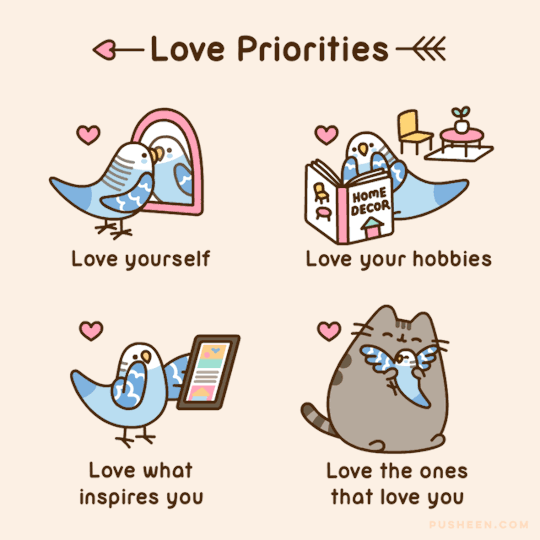Finding resources for myself and sharing them for others as well.
Don't wanna be here? Send us removal request.
Text
“Never say ‘no’ to adventures. Always say ‘yes,’ otherwise you’ll lead a very dull life.”
— Ian Fleming
721 notes
·
View notes
Text
being shut down as a child and told that what you want doesn’t matter
feeling like your words don’t hold any weight and that you have no influence on anything that happens to you
still feeling when you get hurt it’s your fault, because everyone agrees that it is
feeling like nobody will ever want to listen to anything you have to say
feeling like anything you say can’t possibly be important or of any value
feeling like anything you do has no worth or significance simply because it’s you who did it
feeling screaming inside from injustice but knowing you can’t do anything about it
feeling unbearably anxious and angry and helpless you end up harming yourself
feeling guilty for harming yourself
feeling helpless to change anything
feeling like you’re not important enough for your pain to matter
feeling like you probably wont live for long anyway
feeling like you’re disposable, and your life is disposable
feeling like there’s no meaning to life like this
feeling like there’s no way out
feeling like any expression of your pain is attention seeking, selfish, manipulative, abusive, wrong, and like you’ll get shut down and punished for it
because you always were shut down and punished for it
but it’s still nobody’s fault because “you’re not expressing how bad you are so nobody can help you”
feeling like nobody could help you even if they knew
feeling like your pain is a burden
feeling inner frustration so unbearable you want to explode
feeling scared of yourself and what you might do
feeling like you’re a monster even if you can’t figure out just what did you do to become one
all of these are signs of experiencing severe child abuse.
if you felt this, you were abused.
6K notes
·
View notes
Photo
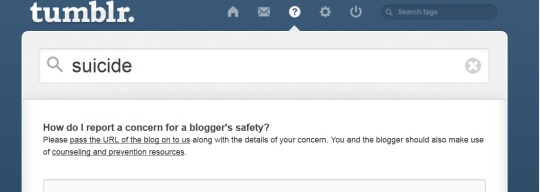
I’ve seen a lot of posts on my dash tonight about users who are threatening suicide, with other Tumblr members posting in effort to try to get ahold of them. I think you all should see this:
IF THERE IS EVER A TUMBLR USER WHO HAS POSTED A GOOD-BYE MESSAGE, SUICIDE NOTE, VIDEO, OR ANYTHING OF THE SORT, PLEASE FOLLOW THIS POST.
1. Scroll to the top of your dashboard.
2. See the circular question mark icon at the top? It’s the third one over from your home symbol. Click on that, and a screen similar to the one in the picture will come up.
3. Where you can type in questions, the box with the magnifying glass at the top, type in the word “suicide.”
4. Click on the first link that shows up. It should say, “Pass the URL of the blog on to us.”
5. Type in the user’s URL and tell Tumblr admin that the user is contemplating suicide and has posted a message indicating that they are going through with it or will be attempting. Hit send! Tumblr administration will perform a number of actions to contact the user and take the necessary steps to prevent the suicide.
TUMBLR: THIS COULD SAVE A USER’S LIFE. PLEASE DO NOT IGNORE SUICIDE THREATS.
Reblog this to keep other users aware. Suicide isn’t a joke, and neither is someone’s life. If you didn’t know this, someone else may not, either. Pass it on.
2M notes
·
View notes
Text
“I believe there are only two unstoppable forces in the universe. One is love, the other is intelligence. I also believe that a person’s capacity to love is directly related to their intelligence level, just as hate corresponds to a person’s level of ignorance. The only thing that makes it impossible for the system to destroy you and grind your spirit into nothing is to be more intelligent than it is.”
— Damien Echols
1K notes
·
View notes
Text
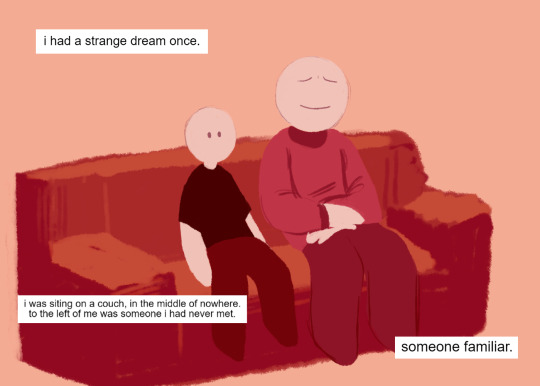
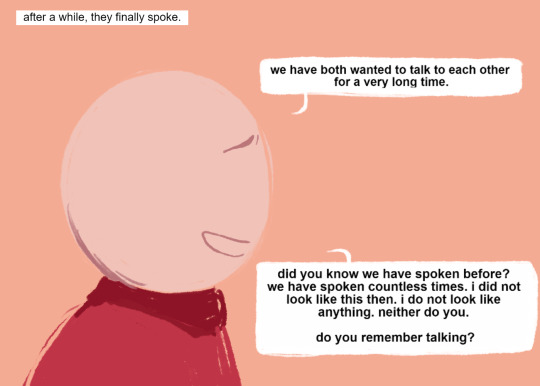
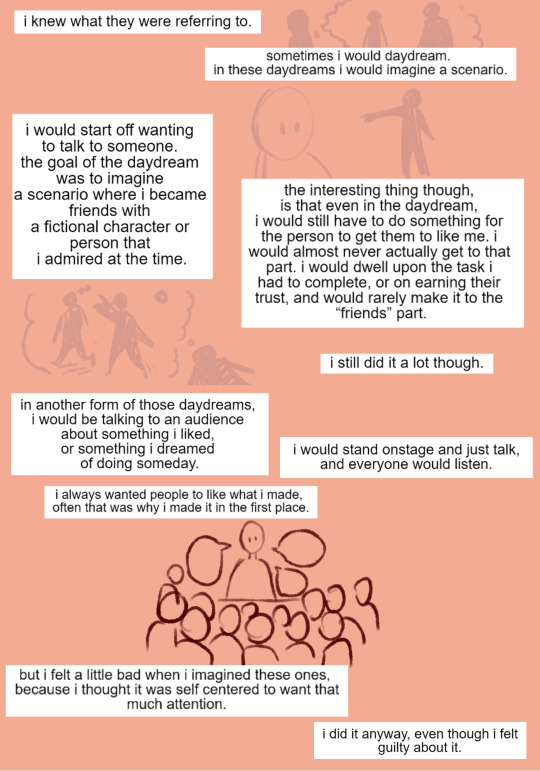
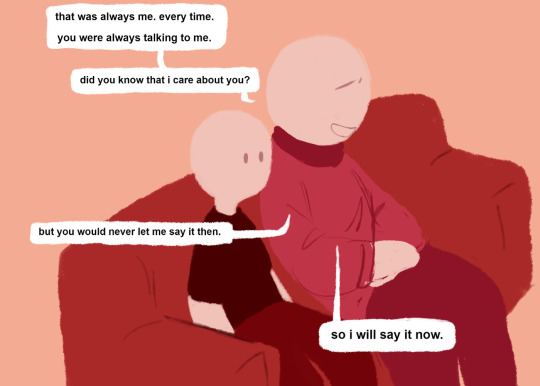
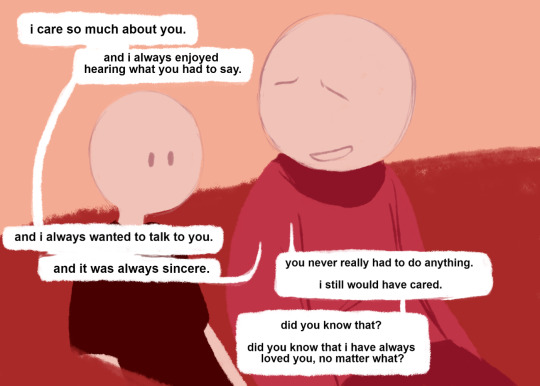
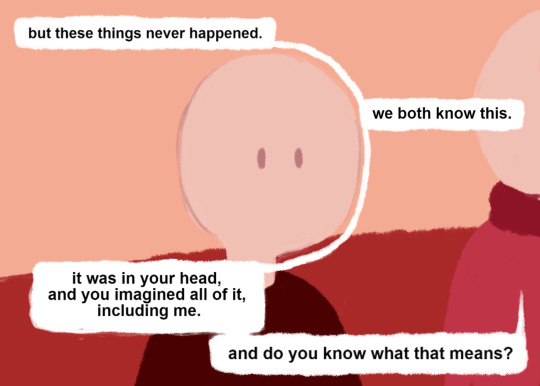
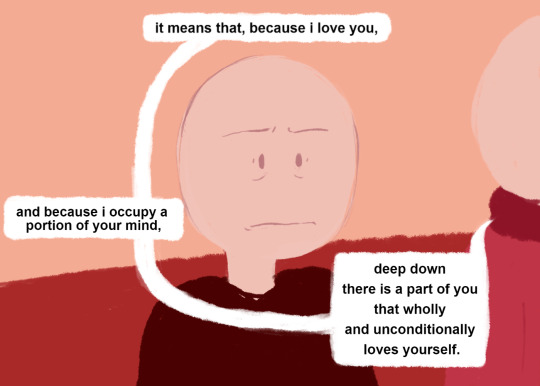
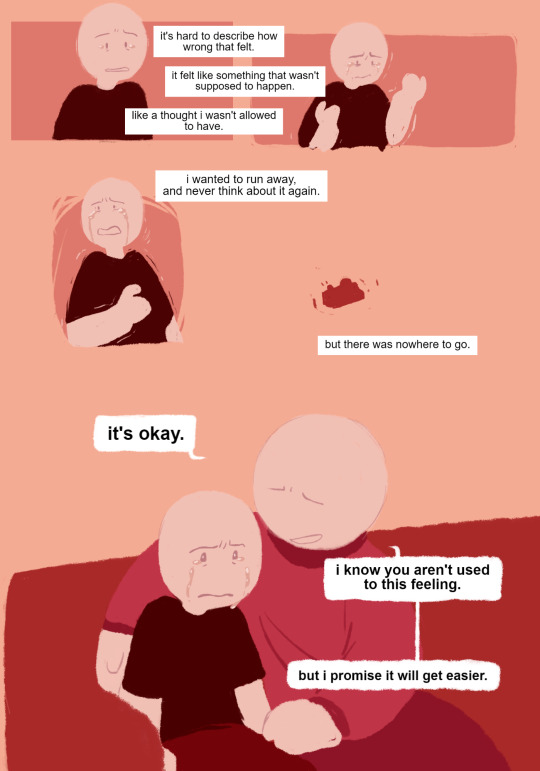
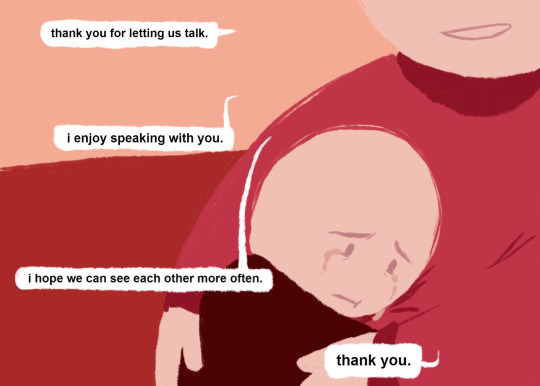
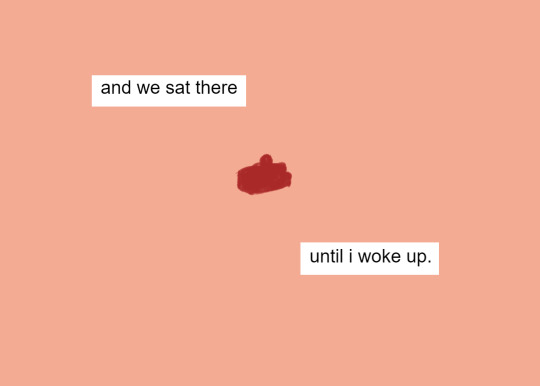
comic about someone’s strange dream (and daydreams)
99K notes
·
View notes
Text
Hey, my love. Here is just a little reminder that every time you felt like giving up, every time you were convinced you were going to quit and every time you said you want to stop living, you didn’t. Life has been brutal, it has kicked you down so many times, but every single time you overcame whatever you were going through. You survived. Now, this is what I call true strength. It is proof that you carry a flame inside of you, so powerful and bright. You can be incredibly proud of yourself. So, every time you find yourself in a dark place again, remember that you are capable of making it out, darling.
2K notes
·
View notes
Text
Don't ever hesitate. Reblog this. This should be in the tumblr laws. When you see it, REBLOG IT.
Depression Hotline: 1-630-482-9696
Suicide Hotline: 1-800-784-8433
LifeLine: 1-800-273-8255
Trevor Project: 1-866-488-7386
Sexuality Support: 1-800-246-7743
Eating Disorders Hotline: 1-847-831-3438
Rape and Sexual Assault: 1-800-656-4673
Grief Support: 1-650-321-5272
Runaway: 1-800-843-5200, 1-800-843-5678, 1-800-621-4000
Exhale: After Abortion Hotline/Pro-Voice: 1-866-4394253
If you ever want to talk: My tumblr ask is always open.
5M notes
·
View notes
Text
“Okay is just a word I use so I won’t have to talk about what’s inside. Okay is a word that means I am going to keep my secrets.”
— Benjamin Alire Sáenz
981 notes
·
View notes
Text
Sometimes on Tumblr, when you talk about narcissistic abuse, or just about narcissists in general, people will tell you that you’re “villainizing” narcissists, or remind you that “not all narcissists are abusers.”
But here’s the truth: Being raised by a narcissistic caregiver is inherently traumatic, even if the narcissist might not often engage in behaviors that are generally labeled abusive.
Children have deep emotional needs that must be met in order to develop emotional, mental, and physical health. Narcissists are, by their very nature, unable to meet those needs.
Children need attunement.
“Attunement is the way caregivers “tune in” to a child’s needs, work to understand their thoughts, and respond to how they are feeling and behaving. Between 2–6 months, babies begin to distinguish between caregivers and others, learn how caregivers respond when they need something, and reach for a preferred person when distressed. Through this time, attunement happens as caregivers begin to develop a special understanding of their baby’s behaviors, feelings and needs. Babies also begin to understand that their caregiver is reliable and trustworthy. Understanding of non-verbal communication and cues increases and the ability to “read” each other becomes stronger.”
The problem is that narcissists are incapable of consistent attunement. They can occasionally be very perceptive about others’ feelings or point of view, but the truth is that to a narcissist, self always comes first. They have a greatly reduced capacity for empathy, and thus a greatly reduced capacity for attunement. If a baby does not experience relatively consistent attunement from their primary caregivers, they become stressed and afraid. Chronic anxiety this early in life, and ongoing as the child grows up, has huge impacts on a person’s emotional and physical health.
Children who experience frequent misattunement from their caregivers “stop expressing their needs, learn to unconsciously reject their needs and then shut down and disconnect from their needs. Dr. Laurence Heller, author of Healing Developmental Trauma says that children who experience this sort of deprivation give up their demand for caring and love. They decide unconsciously that there’s no hope that their needs will be met.” Experiencing this kind of despair so early in life has dire consequences for emotional health.
Children need people to recognize their emotions
Children are not born with an innate ability to recognize, much less deal with, their own emotions. They need early caregivers to teach them to recognize their own physical symptoms of fear, anger, disgust, happiness, sadness, and love. Furthermore, they need help learning to cope with their negative emotions. “The first step to coping with negative emotions is to figure out what you are feeling and to accept those feelings. Even if we don’t accept the bad behavior that often accompanies negative emotions, we still want to send the message that all feelings are okay, even the worst ones.” Children need to be taught to label and validate their feelings; to avoid acting out when they feel sad, angry, afraid, etc; and to find better ways to express and release negative feelings.
The problem here is that narcissists are well-night incapable of consistently validating other people’s feelings. To a narcissist, only their OWN feelings are important; those of other people are lesser considerations. Narcissists have a deep need to be the center of attention, so when their child is distressed, a narcissist may become angry with the child for taking the spotlight away from them, or for making them look like a bad parent by not being constantly happy. When a caregiver’s response to a child’s negative emotions is frequently anger, the child subconsciously learns the lesson that their negative emotions are BAD and that they are BAD for having them. This is the opposite of accepting, validating, and dealing with emotions in a healthy way.
Children whose emotional expressions are frequently rejected by early caregivers often learn to reject their own feelings, developing alexithymia (the inability to feel or identify one’s own emotions) and a variety of emotional disorders. Emotions cannot really be suppressed forever, so unvalidated feelings of fear turn into an anxiety disorder, feelings of sadness to depression, feelings of healthy anger into anger management problems. Unacknowledged emotional distress can also lead to chronic health problems and mysterious chronic pain, as the body desperately tries to signal to the individual that something is wrong.
Children need a feeling of safety and stability
“Children need to feel that… there is stability in their lives. That is why kids need to have a routine and a consistent and stable atmosphere. They should know that their needs will be met and that the people around them will make sure that they are kept safe. So, when a child feels this way, it means that the child feels that his or her caregivers are dependable, reliable, and have a genuine care for the little one.” The CDC points out that “Safe, stable, nurturing relationships and environments for children and their caregivers provide a buffer against the effects of potential stressors.”
Children that grow up feeling generally safe and secure grow up with the subconscious belief that the world is a safe place and that even if bad things happen, they can be okay. Children that do NOT grow up in an environment that feels safe and stable develop the belief that the world is NOT a safe place and that something terrible could (and probably will) happen at any time. A feeling of safety and stability allows a child to relax, which not only reduces anxiety, but also promote digestion, healing, growth, learning, and the formation of healthy relationships.
Unfortunately, narcissistic parents, even when they are not overtly abusive, are not reassuring people to be around. For one thing, they are prone to unpredictable mood swings, especially anger. Not only are the narcissist’s frequent fits of rage inherently frightening to a small child, but it’s very hard to tell beforehand what will set them off. People who live with narcissists frequently find themselves “walking on eggshells” to avoid upsetting them, and this constant threat hanging over a child’s head will not allow them to truly relax.
A child that is constantly physiologically on guard cannot truly relax. Their autonomic nervous system (ANS), which is in charge of fight-or-flight instincts, has a switch that is stuck in the “on” position. When your fight-or-flight is nearly constantly engaged, it interferes with digestion, healing, growth, learning, and the formation of relationships with others. A person experiencing this kind of hypervigilance can develop issues like chronic fatigue (because being “on” all the time is exhausting) or unexplained back pain (because the large muscles of the back tense up with unacknowledged fear).
Children need to feel loved
Children need to feel safe and secure, and that often comes from feeling loved. Love is when a person puts someone else’s needs ahead of their own. Children need, as we have seen, to know for sure that if they have a need–be it physical or emotional–that their caregivers will supply it.
A narcissist is incapable of genuinely putting someone else’s needs ahead of their own. Sometimes they will appear to do so–if there’s something in it for them. Narcissists often want to look to the world like exemplary parents, which may prompt them to, for instance, buy their children everything they want or send them to a good school. But if the narcissistic caregiver doesn’t see anything in it for them, they won’t put the child’s needs first. Emotional needs, which are less visible to the outside world, are often neglected by narcissistic parents, who don’t worry that someone will see such an invisible need going unmet and accuse them of being bad parents.
But love does not consist only in acts of service with no emotional warmth: children also have a deep need for affection from their caregivers. Children are not born with an ability to view themselves accurately. They learn to view themselves as their primary caregivers view them. If a caregiver reflects to the child that they are valuable, lovable, and capable, the child develops a sense of safety, self-esteem, and self-efficacy.
If a good caregiver can be described as a highly polished mirror, reflecting the child’s good qualities back to them, a narcissistic parent most closely resembles a locked door. Narcissists do not value other people, except insofar as they can do something for the narcissist. They are incapable of unconditional love.
In some cases, the narcissistic caregiver only occasionally reflects to the child that they are valuable (only when they are valuable for the narcissist’s “use”): this confuses the child and gives them an unstable sense of self. It can lead to perfectionism and anxiety: the child thinks, “If only I can be BETTER, then I will be loved!” When the caregiver still refuses to consistently validate the child, they will either push themselves even harder, or give up completely.
In other cases the narcissistic caregiver almost NEVER reflects the child’s true worth. In these cases, intense and chronic low self-esteem results, as the child comes to believe that they have no inherent value–because their narcissistic parent doesn’t believe that anyone besides themselves has inherent value. Many children of narcissistic parents go through life feeling unloved no matter how many good and loving friends they have–because they were taught by their early primary caregivers that they were inherently unlovable.
…
In all of these scenarios, the narcissist is not being overtly abusive. They are, however, demonstrating emotional neglect, which is also inherently traumatizing. In some cases, the effects of a narcissistic caregiver’s neglect can be ameliorated by the presence of another caregiver who can supply what the child needs–but in many cases, especially in our modern system of the nuclear family, the child has no adults in their life close enough to bring their emotions to except those they actually live with, and the others in the house are quite likely to be traumatized themselves by the narcissist’s behavior and thus unable to devote the attention and care to the child that the child needs.
Recognizing the traits of narcissists and their effects on their children is not “villainizing”. It is absolutely necessary for the mental health of people who grew up with narcissistic caregivers. It explains their trauma and validates their deep feelings of fear, sadness, anger, and alienation. It helps us recognize other narcissists in our lives whose effect on us may be toxic. It helps us to draw healthy boundaries and choose healthy relationships. It is a necessary step to trauma recovery.
276 notes
·
View notes
Photo

instagram.com/steven via instagram.com/myselflovesupply
870 notes
·
View notes
Text
Hey, my love. Here is just a little reminder that every time you felt like giving up, every time you were convinced you were going to quit and every time you said you want to stop living, you didn’t. Life has been brutal, it has kicked you down so many times, but every single time you overcame whatever you were going through. You survived. Now, this is what I call true strength. It is proof that you carry a flame inside of you, so powerful and bright. You can be incredibly proud of yourself. So, every time you find yourself in a dark place again, remember that you are capable of making it out, darling.
2K notes
·
View notes
Text
“It is an easy mistake to think that non-talkers are non-feelers.”
— Wallace Stegner
2K notes
·
View notes
Text
“Don’t put your life on hold so that you can dwell on the unfairness of past hurts.”
— Nick Vujicic
884 notes
·
View notes
Text
youtube
I often recommend this book because it's helped me a ton. A follower just informed me that the audiobook can be found on YouTube right now! The audiobook is amazing because you can put it on while you do chores or are commuting or whatnot. Life is really busy and it helps if we don't always have to have the time to sit and read to do healing. So here's the book on YouTube. Hope it helps!
380 notes
·
View notes
